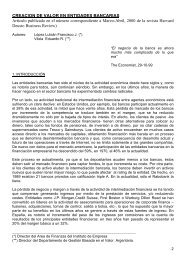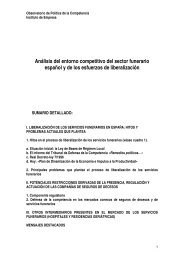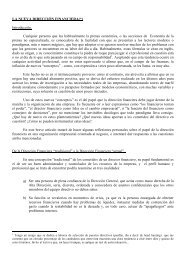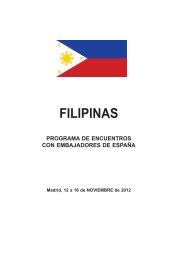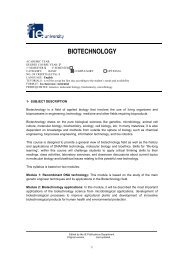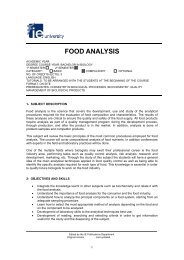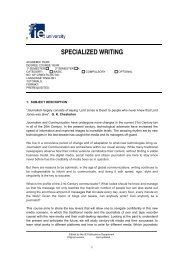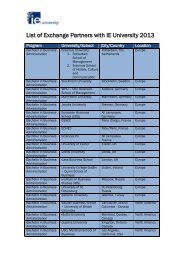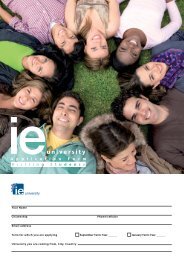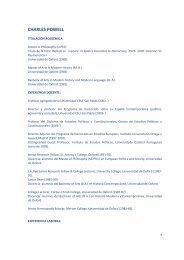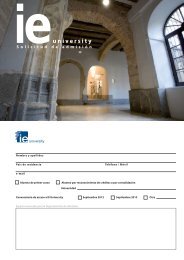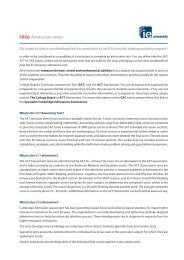SOCIOLOGY AND CULTURE OF CONSUMPTION - IE
SOCIOLOGY AND CULTURE OF CONSUMPTION - IE
SOCIOLOGY AND CULTURE OF CONSUMPTION - IE
You also want an ePaper? Increase the reach of your titles
YUMPU automatically turns print PDFs into web optimized ePapers that Google loves.
<strong>SOCIOLOGY</strong> <strong>AND</strong> <strong>CULTURE</strong> <strong>OF</strong> <strong>CONSUMPTION</strong><br />
ACADEMIC YEAR: 2012-13<br />
DEGREE COURSE YEAR: Bsc, second year<br />
1º SEMESTER 2º SEMESTER<br />
CATEGORY: BASIC COMPULSORY OPTIONAL<br />
NO. <strong>OF</strong> CREDITS (ECTS): 6<br />
LANGUAGE: English<br />
TUTORIALS: after class and by appointment<br />
FORMAT: lectures, discussions, group presentations<br />
PREREQUISITES:<br />
The mass consumption of commodities is at the center of the contemporary world, touching<br />
on every aspect of the way we live, from how we dress, to what we eat, how we structure<br />
our leisure time, and how we communicate with each other. We are so immersed in the<br />
logic of consumer culture that we tend to take it for granted and seldom realize the extent to<br />
which our identities and ways of understanding the world are constructed on the basis of the<br />
commodities we consume and which, in a sense, consume us.<br />
This course aims to provide students with a critical overview of the major approaches to<br />
understanding consumption and consumerism in sociology, anthropology, and cultural<br />
studies. We will endeavor to make the familiar strange by inquiring into the nature and<br />
origins of the consumer society and its implications for how social and cultural life is<br />
organized. Students will acquire theoretical and practical knowledge indispensable for their<br />
professional career and intellectual development.<br />
OBJECTIVES <strong>AND</strong> SKILLS<br />
• To become familiar with the main schools of thought about consumption and<br />
consumerism<br />
• To develop an understanding of key sociological and anthropological concepts<br />
related to consumption<br />
• To acquire skills related to the analysis of social systems and processes<br />
• To build a multicultural awareness of consumer societies and their consequences<br />
• To get better acquainted with social research methodologies<br />
• Interdisciplinarity: students will gain a broad understanding of consumption as an<br />
interdisciplinary area of study<br />
• To improve argumentative, writing and rhetorical skills<br />
Edited by the <strong>IE</strong> Publications Department.<br />
Original version, . Last updated, .<br />
1⏐
CONTENTS<br />
Module 1: Historical Perspectives on Consumption and Consumerism<br />
Module 2: Theories of Consumption<br />
Module 3: Sociological Perspectives<br />
Module 4: Anthropological Perspectives<br />
Module 5: Postmodern Consumption and the Possibility of Resistance<br />
METHODOLOGY <strong>AND</strong> ECTS WEIGHTING<br />
This is a writing-intensive course that takes a seminar-based, dialectical approach to<br />
learning. In addition to participating actively in class discussions, students may be called<br />
upon to lead seminars, make presentations of their research, read and comment on each<br />
other’s work (peer-review).<br />
6 ECTS credits (6 x 25 h/credit = 150 student work hours)<br />
Activities<br />
Classroom<br />
Hours<br />
Sessions Individual<br />
Preparation<br />
Hours<br />
Total<br />
Hours<br />
ECTS<br />
Lectures 13.3 10 13.3 0.6<br />
Seminars and Debates 26.7 20 26.7 1.1<br />
Study, Reading,<br />
66.6 66.6 2.7<br />
Viewing<br />
Writing Assignments 31.7 26.7 1.1<br />
Exam 11.7 11.7 0.5<br />
Total 40 30 110 150 9<br />
EVALUATION SYSTEM<br />
• An in-class written exam covering modules 1 and 2 (20%)<br />
• Two short response papers (2-3 pages each) for module 3 (20%)<br />
• Two short response papers (2-3 pages each) for module 4 (20%)<br />
• Final paper of 8-10 pages based on participant observation exercise (30%)<br />
• Attendance and participation (10%)<br />
o Please note that there is a uniform 70% class attendance requirement in order<br />
to pass the course.<br />
2⏐
The final paper will be evaluated according the following criteria:<br />
An “A” paper demonstrates that the writer has not only mastered the concepts of the course,<br />
but has applied them in an imaginative and incisive way. The paper demonstrates a<br />
command of the language and expresses worthwhile ideas or perceptions clearly,<br />
effectively, in detail, and with virtually no mechanical errors. There is grace to the sentence<br />
structure, which is clear and varied throughout. Documentation is consistent. The “A” grade<br />
is reserved for exceptional papers; “A-” papers tend to be exceptional in part but marred by<br />
one or two problems.<br />
A “B” paper demonstrates that the writer has understood the concepts of the course, has a<br />
sense of their complexity, and has applied them with some originality. The paper shows the<br />
writer can organize a coherent essay with few mechanical errors. The thesis statement is<br />
clear, responsive to the assigned topic, and supported with strong, logical argumentation<br />
and use of evidence. The paper for the most part includes adequate documentation.<br />
A “C” paper demonstrates that the writer has understood most of the concepts of the<br />
course, but needs to pay more attention to detail in reading or writing. Documentation is<br />
erratic.<br />
A “D” paper demonstrates that the writer has only minimal but sufficient understanding of<br />
the concepts of the course. Significant gaps in the writer’s comprehension indicate the need<br />
for more study. The paper shows the writer’s basic compositional skills are below<br />
satisfactory for university work. Documentation is unsatisfactory.<br />
An “F” paper demonstrates that the writer has little, if any, understanding of the concepts of<br />
the course. Because of the writer’s lack of skill or concern, the work includes gross errors as<br />
well as a conspicuous lack of content. Documentation is negligible. The paper may also fail<br />
to address parts of the assignment.<br />
Second Evaluation Period: In accordance with university policy, a student who receives a<br />
grade below 5.0 (“suspenso”) has the opportunity to be evaluated during the second<br />
evaluation period (“convocatoria extraordinaria”) in July. However, as of this year, this<br />
opportunity will only be available to students who have attended at least 70% of classes. In<br />
addition, the maximum possible score that can be obtained during the second evaluation<br />
period has been capped at a maximum of 8.0 out of 10.<br />
A student who has failed the course and not attended at least 70% of classes will have to<br />
wait until the following year in order to have another chance at passing the course.<br />
I do not require that students who have failed the course but met the 70% attendance<br />
requirement show up to an exam during the July exam period. Instead, you will be required<br />
to hand in (by the scheduled date of the exam) any and all written work you have not<br />
previously submitted. In the case of written work for which you did not receive a passing<br />
grade, you will be expected to hand in extensively revised work. Finally, if you failed to pass<br />
the in-class exam, you will be required to complete a (more difficult) “take-home” version of<br />
the same exam.<br />
This above policies apply to all students equally. No exceptions.<br />
Plagiarism: It is your responsibility to follow <strong>IE</strong>’s policies regarding academic honesty.<br />
Plagiarism is, in all cases, a serious academic offence which can result in failing an<br />
assignment, failing the course, or even expulsion from the University.<br />
3⏐


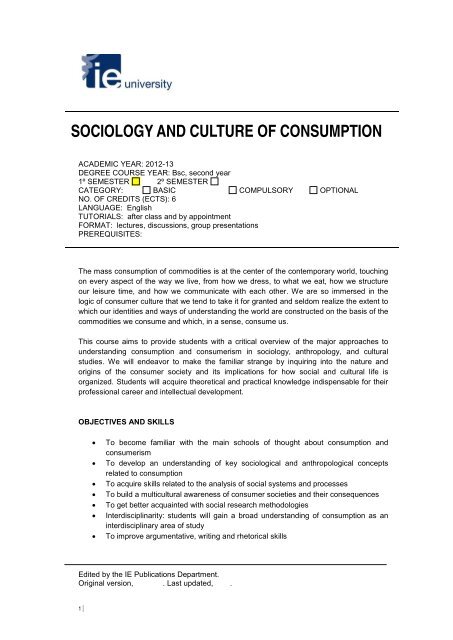
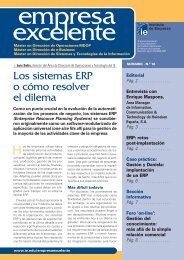
![Change Management Workshop Program Brochure[pdf] - IE](https://img.yumpu.com/22502183/1/184x260/change-management-workshop-program-brochurepdf-ie.jpg?quality=85)
